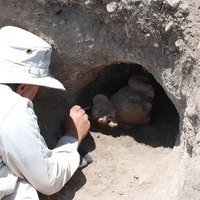
Maite Munoz
Related Authors
Alejandra B B Osorio
Wellesley College
Peter Kruschwitz
University of Vienna
Luca Graverini
University of Siena / Università di Siena
Florin Curta
University of Florida
Gary Feinman
Field Museum
Andrew Wilson
University of Oxford
Francesca Gazzano
University of Genova
Carole Cusack
The University of Sydney
Veena Das
Johns Hopkins University
Karl Baier
University of Vienna
InterestsView All (6)









Uploads
Papers by Maite Munoz
These interventions, which come preferably in the first person, provoke an ironic effect and, at the same time, spread the memory of the deceased, by removing
the most common funerary topics which characterize this «literature of the streets». The epitaph which gives rise to the title (es, bibe, lude, veni,
i.e., «Eat, drink, play, come here») is followed by other many manifestations of humour, which are more or less thick, funny, or ironic, including some nihilistic word games. All these are close to popular thought and modes of oral transmission that influenced decisively classical authors.
attack the emperor Julian as a tyrant and as a rabidus canis, reproach, with which he opens the profile of the emperor as cynical, along with Origen, Celsus and Porphyry (in the beginning of De viris illustribus), decries his anti-Christian books and, finally, justifies a worthy and terrible death of the Apostate (Ep. 70,3,2). Jerome’s specific invective, inserted in the tradition of portraits of mad rulers from the Homeric poems, was relatively popular, as it is demonstrated not only by several poems and hymns, preferably from the Carolingian period, but also by its application to Muhammad and Averroes, among other new enemies of the Christian faith.
Throughout numerous mentions of humanists she attacks –moving to another setting what was being denounced by so many nineteenth-century authors– false erudition, committed to power and luxury, to “imitate what is imitable” (like Panhormita), “quote falsely” (Calderino) or speak “an offensive Latin” (Ficino). The worst of all are “the many hungry scholars” in Rome, who hope the resurgence of the Latin language as something more than a culture vehicle; in front of them, Florence and Poliziano represent the elitist culture which despises the barbarisms of so many false wise men.
These interventions, which come preferably in the first person, provoke an ironic effect and, at the same time, spread the memory of the deceased, by removing
the most common funerary topics which characterize this «literature of the streets». The epitaph which gives rise to the title (es, bibe, lude, veni,
i.e., «Eat, drink, play, come here») is followed by other many manifestations of humour, which are more or less thick, funny, or ironic, including some nihilistic word games. All these are close to popular thought and modes of oral transmission that influenced decisively classical authors.
attack the emperor Julian as a tyrant and as a rabidus canis, reproach, with which he opens the profile of the emperor as cynical, along with Origen, Celsus and Porphyry (in the beginning of De viris illustribus), decries his anti-Christian books and, finally, justifies a worthy and terrible death of the Apostate (Ep. 70,3,2). Jerome’s specific invective, inserted in the tradition of portraits of mad rulers from the Homeric poems, was relatively popular, as it is demonstrated not only by several poems and hymns, preferably from the Carolingian period, but also by its application to Muhammad and Averroes, among other new enemies of the Christian faith.
Throughout numerous mentions of humanists she attacks –moving to another setting what was being denounced by so many nineteenth-century authors– false erudition, committed to power and luxury, to “imitate what is imitable” (like Panhormita), “quote falsely” (Calderino) or speak “an offensive Latin” (Ficino). The worst of all are “the many hungry scholars” in Rome, who hope the resurgence of the Latin language as something more than a culture vehicle; in front of them, Florence and Poliziano represent the elitist culture which despises the barbarisms of so many false wise men.